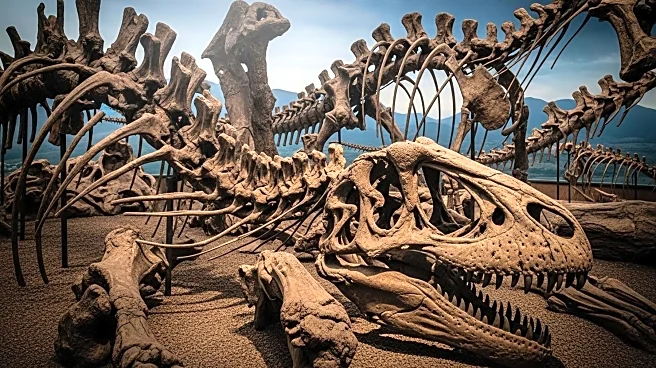What is the story about?
What's Happening?
A recent study has uncovered evidence of a potentially deadly bone disease affecting sauropods, some of the largest dinosaurs in South America, approximately 80 million years ago. Researchers have identified signs of osteomyelitis, a destructive bone infection, in the ancient skeletons of six sauropods found in Brazil. This infection, caused by bacteria, fungi, viruses, or parasites, is known to impact mammals, birds, and reptiles today. The study suggests that the wet ecosystems preferred by sauropods, such as floodplains and swamps, may have been conducive to the spread of pathogens. The fossils were collected from the 'Vaca Morta' site in Sao Paulo between 2006 and 2023, and the lack of healing in the bone lesions indicates that the infections were active at the time of the dinosaurs' deaths.
Why It's Important?
The discovery of osteomyelitis in sauropods provides new insights into the challenges faced by these ancient creatures, highlighting the role of infectious diseases in their lives. Understanding the prevalence and impact of such diseases in dinosaurs can offer valuable information for paleontologists studying the evolutionary history of pathogens and their hosts. This research may also contribute to broader scientific knowledge about the interactions between organisms and their environments, particularly in terms of disease transmission and ecosystem dynamics. The findings underscore the vulnerability of even the largest and most dominant species to microscopic threats, offering parallels to modern-day challenges in wildlife conservation and disease management.
What's Next?
Further research is likely to focus on identifying the specific pathogens responsible for the infections and understanding their transmission mechanisms. Scientists may also explore the ecological conditions that facilitated the spread of these diseases among sauropods. Additionally, comparative studies with other dinosaur species and regions could provide a more comprehensive picture of the prevalence and impact of infectious diseases in prehistoric times. These investigations could lead to new discoveries about the evolutionary adaptations of dinosaurs and their responses to environmental pressures.
Beyond the Headlines
The study raises questions about the ethical considerations of fossil collection and the preservation of paleontological sites. As researchers continue to uncover new information about ancient diseases, there may be implications for modern medicine, particularly in understanding the evolution of pathogens and their interactions with hosts. The findings also contribute to the cultural narrative of dinosaurs, challenging the perception of these creatures as invincible giants and highlighting their susceptibility to environmental and biological threats.















